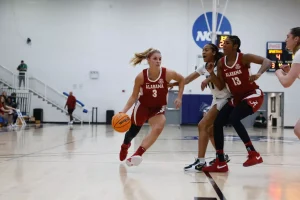Opinion: It just means more?
November 25, 2019
In college sports in general and football in particular, a rivalry is not an event; it is a habit and temperament, a visceral disdain that lasts all year and happens to climax in late November when, for about four hours, records and rankings and winning streaks go out the window, and just about anything can happen.
But rivalry week is about more than pride and postseason implications. It also offers us an occasion to reflect on our team and our conference. This is especially true in the SEC, where, as the saying goes, it just means more. For about as long as I have been alive, “It just means more” has meant more national championships than any other conference, more players selected in the NFL Draft, etc., but the last three years have been different. SEC football is changing, and it is not changing for the better.
The SEC’s dominance over the last decade and a half has been built on a formula that is as simple to understand as it is difficult to actually achieve. The most successful coaches have built their programs on the foundation of defense. Offense is a luxury. Defense is a necessity. Offense wins awards. Defense wins championships.
Before the arrival of Jalen Hurts and Tua Tagovailoa in Tuscaloosa, our football team did not have Heisman candidates at quarterback. Instead, they fielded teams that ranked in the top five in total team defense in eight out of nine seasons from 2009 to 2017, and backed them up with good – though not always great – offenses that could score enough points to win games. Until recently, the same formula was followed by LSU and Georgia to good success.
Unfortunately, the arrival of high-powered offenses to the SEC’s top programs has accompanied lapses in defensive prowess. This is not a fruitful tradeoff. As good as it feels to beat lesser conference opponents by 40 points every week, teams built on this model are consistently unsuccessful in games that matter most. In fact, an entire conference, the Big 12, is composed of teams with prolific offenses and abysmal defenses, and they are consistently embarrassed in playoff games – they are the only Power 5 conference without a playoff win.
SEC fans are beginning to see Big 12 results. The second installation of the game of the century did not resemble the first one in the slightest; ours was the sort of shootout one would expect to see in a game between, say, Oklahoma and Baylor. This new style of SEC team is beginning to resemble the Big 12 in the playoffs, too. Last year’s semifinal between Oklahoma and Alabama saw 79 total points scored, and when Alabama finally faced a top-tier defense in Clemson, they lost by 28. This is the consistent fate of teams that rely on offense to make up for their average defenses.
Clearly, if given the choice between an elite offense and an elite defense, one should choose the latter. There are teams with both, but they do not happen to play in the SEC. One school in a little college town outside of Anderson, South Carolina, has worked its way into national prominence on the back of an LSU-like offense and Georgia-like defense. Clemson has not looked vulnerable since just after syllabus week and, led by Alabama alumnus Dabo Swinney, it shows no signs of slowing down now.
There is a reason that neither LSU nor Ohio State wants to face the best team in the country in a semifinal game, and the only significant consequence of Clemson’s status as the No. 3 seed is that they will be wearing white instead of orange when they win the national championship. Ohio State is similarly built, though the Buckeyes have less playoff experience.
Teams of this mold have consistently shown that they are able to compete – to beat – the best the SEC has to offer, and the only way to change that is for SEC teams to return to the formula that made them great in the first place.










